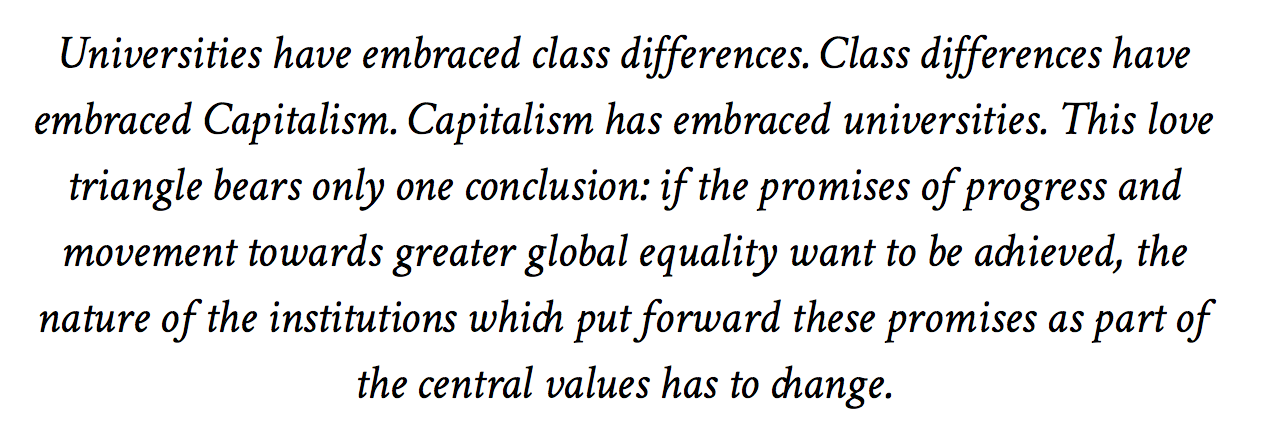Open any elementary History textbook by the ‘Medieval Europe’ section and what you will most likely find is a picture of a triangle, a hierarchical pyramid, reflecting the different, clearly separated, social classes. This separation is not accidental; medieval societies were built on the basic idea that the class one was born in was the one decided by God and, thus, one within which one had to be content. Today, class mobility is a promise; it is the basis of the ‘American (and now effectively global) Dream’. As a goal which depends on hard work in different forms, Education has over the past century been pushed to the forefront, presented as a direct path towards a better future.
The repeated use of this comparative adjective is precisely where the roots of the problem lie. The benefits of having some form of higher education are undeniable; yes, studies and data collection have highlighted that it reduces the likelihood of being unemployed while increasing that of obtaining a well-paid job. ‘Better’, however, implies improvement. Improvement, presumably, from the position (i.e. the social class) one starts off at.
Higher education is overwhelmingly composed by middle to upper-middle-class individuals, that is, by those who already at the beginning of their professional careers have an economic and class cushion they can rely on. The cycle is simple: if better paid jobs and secured employment are ‘luxuries’ (especially in the post-2008 economic crash world) leading to one’s establishment as part of the middle to upper social class, and they are also reserved to those with some form of higher education, then the fact that higher education is majorly accessed by individuals who are already part of these social groups means that the movement of individuals between classes is significantly limited. It quite simply is a vicious cycle.
| Highest Level of Education | Unemployment Rate (%) |
|
No high-school |
13 |
|
High-school |
7 |
|
Some college |
4 |
|
Bachelors or higher |
3 |
[Table: unemployment rates among the 25 to 34 year old portion of the population in the US according to their level of education. Elaborated by the author using data from the NCES 2017]
Although the obviously circular nature of the phenomenon makes pointing at an ‘original cause’ behind hard it, one of the central pillars on which it rests can be identified: why coming from a lower class background reduces the odds of one receiving higher education. The reasons are various.
The economic factor is clear: individuals who have grown up in a family facing economic struggles are not only less likely to be able to afford higher education, but also prone to seeking a job at a young age in order to share the costs of living. Socially speaking, a significant proportion of the members of the lower class belong to communities or areas affected by ongoing social conflict and criminality (especially in the case of newly migrated ethnic minorities), a background which presents a vicious cycle of its own. Immersed in tensions from a young age, members of the community are more likely to view their social situation as inescapable, and may subsequently engage in or simply find themselves involved in the trouble. In profoundly deprived communities, the sheer idea of going to university is laughed upon: under the labels of ‘silly’ and ‘useless’ lies the belief that it is simply is unattainable. The direct consequence? People go on to live their lives in similar communities, commonly raising their children in the same way and under very similar circumstances as they were; generational repetition of the cycle follows.
|
Parents’ Employment Status |
Number of Students Enrolled in HE |
|
Higher managerial/professional |
245, 870 |
|
Lower managerial/professional |
268, 405 |
| Long-term unemployed |
4, 695 |
[Table: number of students enrolled in some form of Higher Education (HE) Institution in the UK according to their parents’ employment status. Numbers from a total of 2, 317, 880 students. Elaborated by the author using data from the HESA, academic year 2016/2017]
The opposite process occurs within the higher social classes, the perception of going to university being a key component. In middle and upper classes, there is an implicit expectation to go to university: it is not based on academic ability nor on the true preferences of the individual, but on the fact that a degree is one of the symbols of success within the adult world. Similar to some kind of modern-day notion of the Socratic idea of a ‘good life’, the idea of happiness as restricted to the limits of what the university system can offer guides most conversations regarding the future of children of these social classes. Education, it seems, even if it’s in the shape of four unfruitful and undesired years at an Ivy League College, is better than a lifetime of real happiness (whatever that is) as a plumber or a supermarket cashier. The medieval notion of class immobility underlies this reality: the social narrative of potential upwards movement rarely materializes, partly because those at the top of the hierarchy don’t consider the different forms of employment to be of equal worth, partly because the construction of the structure doesn’t allow it. Effectively, going to university becomes the differentiating stamp between classes, a gap too wide to be bridged.
This doesn’t mean, however, that lower class students don’t access higher education: they do, even if in small numbers, fact which is used by universities themselves to satisfy state education requirements and pin the badge of ‘diversity’ on themselves. Despite this, a primary assumption taken by institutions potentially places them a step behind their peers: the belief that students bring ‘cultural baggage’ along with them. Cultural baggage is the knowledge about general aspects of the mainly Western culture which an individual gains through the experiences and interactions shared with those in charge of raising her. Although being truly ‘cultured’ is not something that all higher class students are, they do all share the economic means to fully access the ‘cultured world’ – books, theatre, music, films. University expectations and courses are built around the false assumption that students will be able to refer to their cultural baggage, or gain access to it, in order to fully and adequately approach their studies.
Capitalism relies on the existence of class differences for its own survival, as it requires a large labor force which will perform the necessary (yet ‘menial’ and ‘secondary’) jobs while being economically exploited (the discussion of wages and working hours, even inside the EU, is complex and long enough for a whole different article) by a smaller portion of beneficiaries who will continue to invest in, and thus feed, the system. Higher education, and university degrees specifically, serve to draw the line between those who will, under normal economic circumstances, be expected to take up these exploitable jobs, and those who won’t. If everyone had a university degree, the capitalist dynamics wouldn’t work, for the number of (and the need for) highly qualified positions is limited. The minute having a university degree is no longer a plus for accessing these positions, but a basic minimum requirement, the drawing of the lines between the social classes becomes irreversible. If individuals need a degree to even be allowed to take part in the competition for better jobs, those without one (for the reasons explained) are directly cut out. And off goes the cycle again.
This is not a one-way relationship. The importance of universities is constructed, as so is their ability to prepare individuals for the professional job. If there is no overarching content to be learnt, teaching style to be followed, or exams to be passed, how can one speak of a solid global university system? Precisely through this imposition of respect for a non-existent overarching authority (i.e., for universities as institutions) Education upholds Capitalism. Students are guided towards a specific value system in which basic components of the structure are implicitly deemed immovable, with discussions always taking a western-centric perspective which is only slightly and rarely (and in an arguably neo-colonial way) shifted towards the non-Western world. While selling the ideals of independent thinking and innovation, universities continue to produce ‘pieces’ which will work according to the given system dynamics: through essays, referencing styles and exams, the idea of fixed regulations and of fulfilling arbitrarily fixed expectations is ingrained in the students minds, turning it into a goal whose direct translation is a hierarchy of importance– work comes before anything else.
Universities have embraced class differences. Class differences have embraced Capitalism. Capitalism has embraced universities. This love triangle bears only one conclusion: if the promises of progress and movement towards greater global equality want to be achieved, the nature of the institutions which put forward these promises as part of the central values has to change. And it has to change now.
[Note: the conclusions drawn in this article all use data from the American NCES, the British HESA, the Spanish INE and the Eurobarometer. Numbers and complete studies can be found on their respective websites online.]




